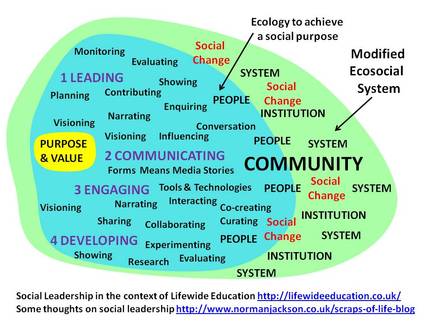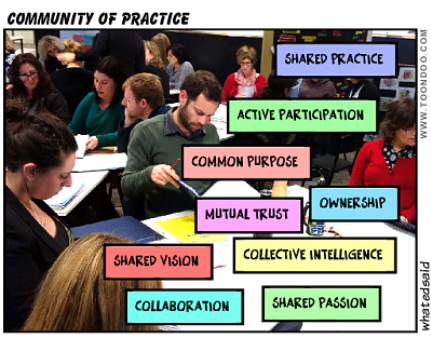
Figure My representation of social leadership. All this stuff goes on, some of it will be planned and co-ordinated but much of it will be emergent and improvised. The social leader creates new ecologies for learning, developing and achieving the social change he desires.
A teacher is a leader and facilitator of a social process that is created in order to help and enable participants in the social process to learn and develop. Our formal system of education provides an eco-social system whose purposes is to educate people to become responsible, productive, engaged and fulfilled citizens contributing to the economic, cultural and social prosperity of our society. There is no doubt that the outcome of formalised education has both individual and social benefit. The idea of teacher as a social leader contributing ultimately to society is therefore worthy of consideration.

So how might the core elements of social leadership relate to a higher education teacher?
1 Social leadership is about 'leading'. It's about envisioning and articulating a sense of purpose, direction and more concrete goals, then creating and working with others to co-create the conditions that encourage movement towards these goals. It involves all the things you associate with leadership like planning, securing and managing resources, building capacity to do things, contributing time and effort to make things happen, monitoring and evaluating progress and making self-accountable to the community. Actions speak louder than words - It involves modelling one's own behaviour in ways that demonstrate you believe in what you are doing and embody them in your actions and behaviours. Reputation and authority are personal rather than organisational and they have to be earned through things that a social leader does.
Commentary: A teacher's role is to create [design and implement] a process through which their students can learn and develop. They have a vision of what they want their learners to achieve and some clear objectives which are usually shared at the start of a learning process. They plan the route they will take - the teaching and learning activities, and they find and develop the resources they need to promote learning. They monitor and evaluate the progress they and their students are making and adjust their actions accordingly. Ideally they demonstrate through their own behaviour how they want their learners to behave.
2 Social leadership is about 'communicating'. Social leaders have to be communicators, how else will people know what they stand for and understand what they want to achieve? They have to turn abstract ideas into stories that people can understand and care about. Communication is about trying to influence the way people think and see the world and offering alternatives to what currently exists. Social leadership is about creating and co-creating narratives that explain the proposition for social change and inspire and compel people to get involved. These forms of communication facilitate development of relationships connecting people to the purposes, values, ideas and challenges that underlie the social enterprise. Communication takes many forms - written, spoken, visual and may involve many different media using many different tools.
The internet and technological tools of the Social Age provide many aids to this process and enable social leaders to reach out to people in ways that would not have been possible even a few years ago. As Julian Stodd points out the social media we now have access to enable 'social collaboration and reach [and] socially collaborative conversations, about the co-creation of meaning in communities, about supporting engagement and development in these communities and about collaborating, to achieve more than we ever can alone'1 They help social leaders accomplish the social changes they are seeking.
Commentary: the role of the teacher is to help their learners develop new perspectives, new ways of seeing the world often through the conceptual knowledge they are drawing on. Teachers have to communicate abstract ideas and concepts in ways that learners can understand and make sense of. They have to be aware of how the knowledge they are providing is being understood. Communication takes many forms but in the classroom the spoken and written words, audio/visual aids, tools and artefacts are all used in different situations. In communicating ideas teachers have opportunities to utilise all the information and communication tools that are available. A good teacher will develop narratives that help learners make sense of and see the relevance of what is being taught.
3 Social leadership is about 'engaging' people: Having identified a purpose or cause that will connect to what people will believe and value the role of the social leader is to try to involve people in bringing about social change. This is about the ways and means or capabilities that leaders and their teams can bring to the task and these will reflect the nature of the proposition and the cultural practices of the domain. Engagement may involve such things as distributing information, holding meetings and conferences, creating on-line forums and blogs, conducting inquiries, surveys and other research, sharing practices, collaborations, co-creative activities, campaigns and other forms of collective actions, utilising tools and technologies of the Social Age. The social leader is also responsible for ensuring that the products and results of such activity are curated and utilised in the further pursuit of social goals.
Through these processes, relationships and activities people who are interested begin to form community - at one level this may simply be declaration of interest in an idea and a willingness to receive information and stay connected and informed. At another level it involves people actively getting involved taking new ideas and doing something with them for example being an advocate or champion, campaigning and the creating of new resources and practices. Eventually, if sufficient people buy into the ideas and ideals, social change may occur.
Commentary: the role of a teacher is to engage her learners in the content and concepts being taught. Their role is to stimulate and ideally inspire interest and encourage learners to construct their own meanings and understandings through the learning process. The ways and means of the teacher are embodied in the skilful way they include and enfold learners into the process. The way they involve them actively in their own learning, the tasks they set that motivate learners to demonstrate what they know, to share ideas and build on the ideas of others.
The idea of a 'flipped curriculum' as a form of social engagement makes sense in a social leadership model of teaching. Ariel Diaz talking at TEDxCambridge 2013 tells the story of how, as a 10 year old boy, he became fascinated by Formula One racing cars and it inspired him to study engineering. He maintains that 'education is created by experts and because they have so much knowledge about their subject they try to teach the detail before they share their understanding of the beauty of the subject that got them excited in that subject in the first place'. His solution is to invert the curriculum - begin with the big inspiring ideas that give the context and purpose for studying something... then take students along a pathway which allows them to discover things for themselves before immersing them in the detail that reveals the inner workings of the subject. The wisdom in this story is that this is the way we learn in life outside the abstracted world of formal education. We find things we are interested in or need to know about and then work out how to gain a deeper understanding. Our interests, passions and needs provide us with the purpose that makes us want to learn more. We begin with the problem, the opportunity or the vision, we work out some ways of finding out more before we get into the detail of problem working or solution finding. Diaz's solution to making formal education more relevant, exciting and meaningful is to flip the entire curriculum 'we need to start with the big ideas because when you start with big ideas you give students a great context and relevance for the subject they're about to study and also create inspiration and motivation. Then when you have this context and motivation you're able to create a natural and not forced learning pathway because that excitement that motivation leads to questions - how and why and then by answering those questions you get to organically build a deep [and personally significant] knowledge and a deep expertise.'
4 Social leadership is about developing ideas so they can be turned into new social practices: social leaders take ideas and purposes that motivate them and develop them, with the help of others, so they can be applied more easily. Development means a progression or movement from a simpler or lower to a more advanced, mature, or complex form or stage. Development is a process to achieve certain goals in certain ways or a trajectory along which certain things change or are accomplished. It is the process that enables everyone to change themselves and the social worlds they inhabit. It is the process through which new things - material or virtual objects, social practices and performances are brought into existence or changed.
Social leaders share their thoughts and ideas and encourage others to criticise or offer different perspectives. They seek to underpin their ideas with research and enquiry and involve themselves and others in developing evidence to support their propositions. They connect to authorities that are willing to lend their support and they collaborate with people who are willing to show how ideas might be applied. They experiment with their own practices and evaluate the results.
Commentary: the role of teacher is enable learners to develop themselves by taking abstract ideas and concepts and factual content and providing opportunities and contexts for learners to discuss and apply such knowledge in ways that make sense to them. A good teacher will design activities and assignments that enable learners to apply their knowledge creating new behaviours and practices and deepening understandings. A teacher as a social leader will participate in such collaborative enterprises showing how they apply their knowledge in their practices.
5 Social leadership is about creating ecologies for changing existing ecosocial systems: Inspired by their vision for a better society, social leaders create new ecologies comprising their processes and contexts, relationships, networks, interactions, tools, technologies and activities that provide them with opportunities and resources for learning, developing and achieving something of social value. As they embrace and include people who share their spirit, values and beliefs into their learning ecology they establish new ecosocial systems for change.
Commentary: the role of the teacher is to create an ecology for learning in which their learners can participate. They are the designers and implementers of an ecology for learning which enables them to achieve something of social value - the development of their learners. Their ecologies provide the context and relationships for learning, tools, technologies and resources to support learning and activities and assessments that enable learning to be practised and demonstrated. In the Social Age teachers have a responsibility to be social leaders. To show learners how to create their own ecologies for learning and development.. To enable them to experience what being part of a community of learners engaged in educational practice means and to help them learn to share their ideas, perspectives and experiences so that they are better prepared for a lifetime of collaboration.
I welcome further perspectives on the role of teacher as social leader.
1 Stodd, J. articles on Social Leadership http://julianstodd.wordpress.com/?s=social+leadership




 RSS Feed
RSS Feed